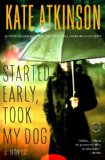Book Club Discussion Questions
In a book club? Subscribe to our Book Club Newsletter and get our best book club books of 2025!
For supplemental discussion material see our Beyond the Book article, Decoding British Phrases and our BookBrowse Review of Started Early, Took My Dog.
Please be aware that this discussion guide will contain spoilers!
- "For want of a nail the shoe was lost / For want of a shoe the horse was lost..." How do you think this traditional proverb, quoted by Kate Atkinson before the start of the novel, relates to what happens in Started Early, Took My Dog?
- Another epigraph quotes Peter Sutcliffe, suggesting that this novel was partly inspired by the 1970s Yorkshire Ripper. Are there any other true crime cases that come to mind that resonate with the stories in this book?
- A reviewer called this a "state of the nation novel - far sharper and more observant and satirically understanding than anything else out there at the moment." Do you agree, and if so, what did the novel reveal for you about Britain today?
- This is the fourth Jackson Brodie novel. What qualities make the former police detective so attractive to readers? And would you want to see him appear in another novel after this?
- Another reviewer called Kate Atkinson "possibly the only author writing crime fiction that is also writing literary fiction alive today." What are the elements that turn Started Early, Took My Dog into crime fiction, and what are its literary features? And do you agree
with the way fiction is commonly classified into these separate genres by the critics, and also in libraries and bookshops?
- On an impulse, Tracy Waterhouse buys little Courtney for a wad of cash from a woman she assumes to be her mother, after witnessing her behaving abusively toward the child. What do you think of Tracy's motives, and do you think this kind of unusual transaction could ever be morally justified?
- How do Courtney and Tracy change each other's lives, and in what ways are they important to one another? How does their relationship compare to Jackson's relationship with the dog?
- The book alternates between telling part of the story in the 1970s and part of the story in the present day. What has changed between what was going on in the seventies in the police force and what is going on now? What is the same? How does Atkinson weave these two time periods together?
- The characters in Started Early, Took My Dog are all tied to the past in different ways; some are held victim to it, but no one can escape it. How does the past influence the present lives of the characters in the book?
- Discuss the role of guilt in the novel, and how it affects different people (e.g. Barry Crawford, Len Lomax, Ray Strickland, and Linda Pallister).
- Sexism is an issue that shows itself in many forms throughout the novel, particularly in the police force in the 1970s. What type of sexism did Tracy and the other female characters face? How is that reflected in the way female prostitutes and female victims are portrayed in the book? Were you able to see past the sexism of some of the characters in the novel?
- Kate Atkinson's novels have often featured lost or abandoned children. Discuss the role of the lost girls - Courtney and Hope McMaster - in Started Early, Took My Dog. How do they relate to the other lost girls in Jackson's own life?
- Many of the women in the novel have no children of their own, for various reasons. How does each character manage her desire to have children, or her struggles when she loses her children?
- The title is taken from a poem by Emily Dickinson, a poet Jackson Brodie has recently discovered, and it ends with another Dickinson poem, "Hope." Why do you think Kate Atkinson decided to finish on this note?
Unless otherwise stated, this discussion guide is reprinted with the permission of Reagan Arthur.
Any page references refer to a USA edition of the book, usually the trade paperback version, and may vary in other editions.
